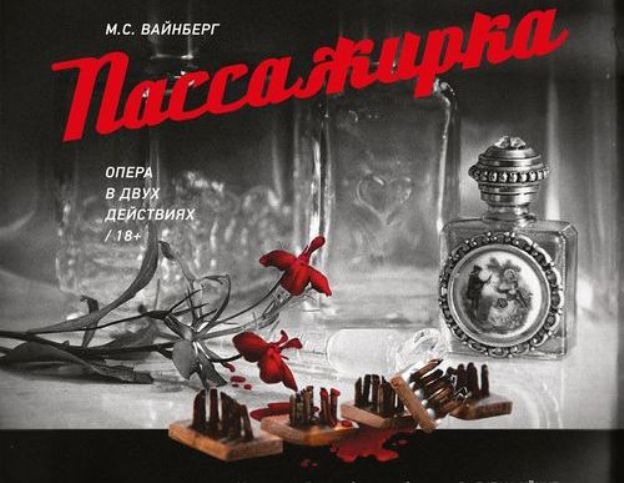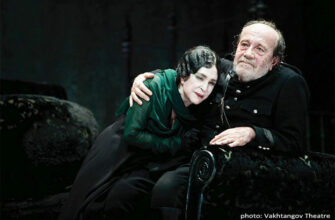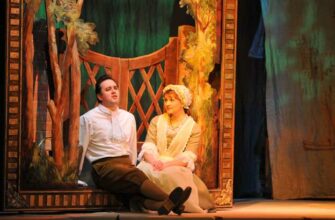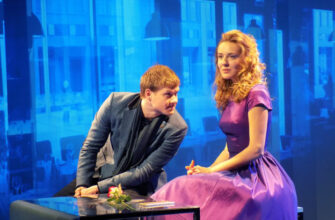On 27 Jan 2017 at Kolobov Novaya Opera theatre will be opened Epiphany festival under the mysterious name “Old New age”. It promises us a few masterpieces of XX century, and some new compositions too.
The first of these masterpieces is the Moscow premiere of the Opera of Moisei Weinberg’s “The Passenger” on the Main stage. The festival opens on January 27 with this opera. More recently, Weinberg’s Opera became widely known in the world. New Opera is the second Russian theatre addressed to this essay (the first was the Yekaterinburg state academic theatre of Opera and ballet in September 2016). Moscow staging is patronized by I. Kobzon, the music Director is Kolobov Novaya Opera’s chief conductor Jan Latham-Koenig.
On February 4, will be represented a concert version of the opera “Pushkin” (“The poet and the king”) written by K. Boyarsky. It is an essay devoted to the difficult relations between the poet and king Nicholas I. The libretto was written by the British descendant of both Marita Phillips.
On February 9 in the Foyer of mirrors will be performed chamber opera by Valerie Besedina “the Imposter”, dedicated to the Princess Tarakanova.
In addition, the festival is expected to show operatic diptych DIDO. (placed into a single composition of the Opera “Dido. Prologue” by M. Nyman and “Dido and Aeneas” H. Purcell) “School for wives” by V. Martynov, “Maddalena” by S. Prokofiev and “Players” by D. Shostakovich, and the Concerto of chamber and spiritual music.
Michael Segelman, music critic and head of the literary section of the Moscow theatre New Opera told readers of cultural-political magazine “E-Vesti” some details of the festival program.
E-Vesti: Michael, please tell us will the festival in 2017 differ from previous festivals?
Segelman M.: Of course. Winter festival at the Novaya Opera has been held since 2005; previously, it was called “Epiphany week”, and in 2014 — “the Epiphany festival at Novaya Opera”. It is not only the name change, there was some kind of reformatting, the festival has become more conceptual. Each time a theme is selected. For example, in 2016, the festival was called “Dialogues and doubles” is a composition inspired by the same subject or genre as Mozart’s Requiem and the Requiem by Andrew Lloyd Webber.
This year’s festival is called “Old new age”, it is dedicated to the music of the XX-XXI centuries. There is the concept of “modern music”. In the narrow sense this mean new works that created before our eyes. But the concept has broader meaning when modern is everything we don’t know, including what we missed in music of the twentieth century.
Music of the past centuries is often too complex in language, technique of composition, it doesn’t have usual intonations or Opera forms, melodies in the usual sense of the word. All this leads to the rupture of the so-called classical music with the audience.
Our “Old New Age” believes the twentieth century music is the music of the XXI century. In addition, we all experienced the moment of transition from one Millennium to another, from one century to another, and it is always a moment in the culture which is very important, and the feelings of the people who crossed the border – a little bit more intensive. This results the name “Old New age”. In addition, there is an allusion to the Old New Year, which happens in 13 days just after the New Year.
Regarding program…. We have all-new works, like the Opera house “Pushkin”. This Opera, written by a modern Russian composer Konstantin Boyarsky, who for several decades is living in the UK and combines a career as a composer and performer, written on a libretto by Marita Phillips. She’s English, but she is a great-granddaughter of Pushkin and Tsar Nicholas I at the same time. It is very interesting because, as we know, Pushkin had very complicated relationship with the king, from love to hate. The king was involved in this terrible story that killed Pushkin. All of these things important for Pushkin, – the protection of honor, life, reflections about art – was reflected in the libretto, which will be presented in a concert performance.
EV: According to a press release, Opera is bilingual. It seams that the libretto is in English, while the poetry of Pushkin – in recited in Russian?
Segelman M.: Yes. Marita has incorporated elements of Pushkin’s poetry, which is read by Pushkin himself. There is a motive that these poems instantly become public domain, read by everyone, including the king. The libretto in English, and Pushkin poetry, fortunately, is given in the original, not in translation. It’s pretty visible that we are talking about the source. As soon as there is Russian text, so is Pushkin.
EV: And the music carries something Russian or is it contemporary music?
Segelman M.: I don’t know the music of this Opera. Composer Boyarsky said that he was not trying to keep up with musical fashion, and that the language of this Opera is quite traditional and close to most listeners.
EV: About “the Passenger” Weinberg productions, which was patronized by Joseph Kobzon: what is highlight and how this relates to the theme of “Old New Age”?
Segelman M.: Weinberg is an amazing figure in music of the twentieth century. The composer, for a long time wrongly considered the imitator of Shostakovich. He was known, respected, but it took some time to realize how major figure he is in music of the twentieth century. So Weinberg is a composer old and new at the same time. Ten years ago began a tentative revival of interest to Weinberg in Russia. First of all, the firm “Melody” was released a few older recordings (reissued on CD), and I was lucky enough to be their editor. At the end of 2006 in the Moscow international house of music hosted the world premiere of the Opera in concert performance under the baton of conductor Wolf Gorelik.
The Opera was written for the Bolshoi theater in 1967, but in the midst of the rehearsal period it was banned. This wonderful composition treats the difficult topic of the Holocaust in a deeply personal way, because it was a terrible part of life experience of Weinberg, and of Polish writer Zofia Posmysz as well. They talked about abstract retaliation, they conveyed the pain and experience in music. Weinberg went through the Holocaust, his family remained in Poland and perished in concentration camps. He escaped to Soviet Belarus, then came to Central Asia.
The triumphant return of this Opera occurred at the festival in Bregenz in 2010 directed by David Pountney. After setting this Opera on the various stages of the world, the revival of interest in Weinberg’s music at all became evident. Just in the last 5-6 years, interest to the music of Weinberg became an avalanche, his operas are represented one after the other, in Europe and in the world music festivals, there are international conferences for the study of his legacy.
EV: Why Joseph Kobzon has decided to support the staging?
Segelman M.: The answer for Joseph Davidovich, of course, would be wrong. I can only say that this subject (the Holocaust) have gained immense public importance. It is absolutely clear that the “Passenger” by Weinberg exists in the context of the great European tradition of reference to the Holocaust. This tradition differs from the American one, which is, in my opinion, somewhat didactic. A brilliant manifestation of the European tradition – my favorite movie is “the Pianist” Roman Polanski, the emphasis not on showing the horror, but the human experience. In this sense, Opera Weinberg is related to Soviet culture. Remember the movie of Larissa Shepitko “the Ascent”, which is dedicated to war and the theme of betrayal. It is clear that this project is a clear humanistic orientation. I would even say that the Ecumenical orientation, because Weinberg was important not only the Holocaust as a tragedy of the Jewish people, because in this Opera in the concentration camp there are children of different Nations, and they are all the executioners and the victims are the children of God. This concentration camp – a model of the world in which people are trying to save a human face and human dignity. In our formulation (under the influence of the performance Pountney) emphasized the fact that all the characters sing in the language of his people.
EV: What can we expect from the chamber Opera “the Imposter”?
Segelman M.: Valeria Besedina is a composer who writes tonal music, she cares about the listeners, and underlines in her Opera a Russian flavor. This story sends me to the famous play by Leonid Zorin’s “the Tsar hunting”, which is embodied in the theatre and in the movies. But Opera Besedinoy written in the original libretto, its authors — sama Valeria Viktorovna and her son Svyatoslav. The Opera with piano accompaniment will be interesting to listen to in the Mirror foyer, our platform for programs of chamber music and performances of the small form.
EV: It turns out that for your festival has the historical perspective?
Segelman M.: Yes.
For example, we have a chamber music concert. That’s two piano quintets (piano, two violins, viola and cello), hence the title of the program is “Double-five…”. There will be a Quintet by Shostakovich – a brilliant and, I would say, a textbook essay, which was awarded the Stalin prize. And next Quintet by Erich Corngold, which is written at the turn of the 1910-1920 years. This is a work, which is not played in Russia practically.
And the final concert combines three samples of sacred music of the XX century. All of these samples are not music for worship, but sacred music in the Ecumenical sense, connected to the humanistic aspects of different religions. For example, “Chichester Psalms” by Leonard Bernstein written in the texts of the Psalms in Hebrew, and “Symphony of Psalms” by Stravinsky sounds Latin. Requiem Lloyd Webber – this work, which was played at the festival last year, where it was compared with Mozart’s Requiem. It is happened so that Requiem Lloyd Webber fits well in the concept of this festival, so the conductor Andrey Lebedev decided to repeat this performance, especially since it was a huge success, and aroused extraordinary enthusiasm among the musicians.
EV: I feel that You would be very interesting to listen to this program, is that right?
Segelman M.: Yes. I have the honour to serve to the Kolobov Novaya Opera. As a musician I am very interested in the events that formed the poster of the festival. This is a story which is before our eyes, and we try to put here something we can. Of course, I’ll be at all the events of the festival. Moreover, many of them are unique. Some essays that we offer it is impossible to hear in any other place.




